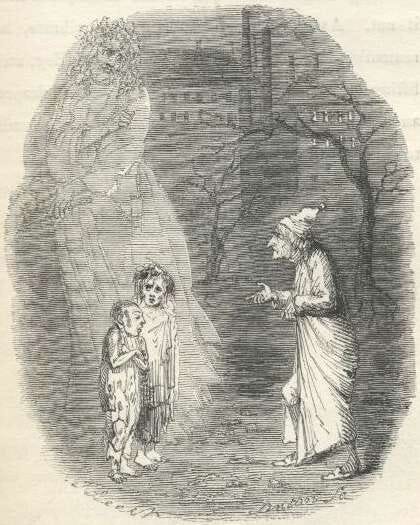An Oregon Christmas Carol, Part 2
The power of kinship and compassion is an infinitely renewable resource. It takes bravery, creativity, trust, and love to transform a human spirit.
Housekeeping
This is the 100th post on The Oregon Way. Thank you to our contributors for sharing their perspectives on the shared values that unite us as Oregonians.
Share your favorite Oregon Way post via social media before the end of the year!
Assist our effort to connect Oregonians — complete our readership survey.
The first chapter of Kevin Frazier’s book, Rediscovering the Oregon Way, will be released on Saturday.
To the post!
Sarah White is the founder and director and Hilary Dumitrescu is the board V.P./Treasurer of Sheltering Silverton, a nonprofit dedicated to ending chronic unsheltered homelessness in the Silverton, Oregon region. Both of them think the other one is the “real brains of the operation.”
Please read “An Oregon Christmas Carol, Part 1,” before continuing to Part 2.
Stave III: Christmas Present
“Spirit! are they yours?” Scrooge could say no more.
“They are Man’s,” said the Spirit, looking down upon them. “And they cling to me, appealing from their fathers. This boy is Ignorance. This girl is Want. Beware them both, and all of their degree, but most of all beware this boy, for on his brow I see that written which is Doom, unless the writing be erased. Deny it!” cried the Spirit, stretching out its hand towards the city. “Slander those who tell it ye! Admit it for your factious purposes, and make it worse. And bide the end!”
“Have they no refuge or resource?” cried Scrooge.
“Are there no prisons?” said the Spirit, turning on him for the last time with his own words. “Are there no workhouses?”
It is difficult when our own history comes back to bite us. Oregon’s state motto, “Alis volat propriis” (“She flies with her own wings”), belies an early and pervasive allegiance to the idea that every person is responsible only for themselves.
This inborn NIMBYism (Not In My Backyard) has left Oregon’s rural communities struggling to provide enough affordable housing and living-wage jobs for their residents. Still more troubling, while Oregon’s economy has one of the highest potential growth rates in the nation; our opportunity index is much lower. What’s more, we have the highest rates of substance abuse nationally (yes, even before Measure 110 passed), as well as the highest rate of mental illness. It would appear as though the state is not so much “flying” as it is floundering; Oregonians would like to fly, but their wings have been clipped.

Portland liberals are accused of promoting a welfare state, but the general welfare is suffering for all but a select few in this state. Our state ranks highest in the nation for unsheltered families with children and we have the second highest rate of rural homelessness. Our emergency shelter and housing infrastructure lags far behind the rate of homelessness, leaving the vast majority of displaced people without any shelter.
We are simply failing our neighbors.
A man like J., illiterate, abused, broken-bodied, and destitute, was precisely what Dickens must have had in mind when he revealed the Children of Ignorance and Want.
A safety net that fails to catch Oregonians
When we talk with other organizers and non-profit leaders from rural communities, they share similar stories of communities torn apart by the impact of inter-generational poverty, homelessness, addiction, lack of affordable housing, and lack of living-wage jobs.
While organizations like ours, that started with neighbors connecting to each other, often find overwhelming community support, we also face headwinds of NIMBYism and erroneous beliefs about the availability of resources—resources that either don’t exist or fail to meet the overwhelming need. Many also assume that there’s a human services infrastructure in place to catch those that fall through the cracks; but, when the cracks are as big as Thor’s Well, many Oregonians never receive the attention and support they require.

For instance, in our two-county region, the number of shelter beds continues to hover at around five hundred, but the number of homeless bodies has for years hovered around 2,000. At the same time, grassroots efforts struggle to access the resources that trickle down from the Federal Government through layers of bureaucracy and gatekeeping. If the process was streamlined, our organization and others would be better able to respond to the persistent need.
Another hurdle is the fact that one-size-fits-all rules frequently leave rural Oregonians even further behind. Big-city boundaries designed to prevent fraudulent claims become impermeable barriers to assistance when they are applied to rural communities. We simply don’t have the resources to navigate the labyrinth of governmental requirements that stand between our neighbors and the help they need.
And, the need is great and growing. As of this writing, Congress has still not passed a stimulus bill.** If one does not materialize, 70,000 Oregonians and 12 million other Americans will lose their unemployment benefits on the day after Christmas.
For now, we do what we can. Our daytime shelter resource center is lit up for the holidays, and provides kinship, meals, warm clothes, camping supplies, and connection to local and regional housing resources. Our partners at MWVCAA and our newly formed Mid-Willamette Valley Homeless Alliance (our two-county Continuum of Care) have led the charge on inter-agency collaboration, organizing winter shelter in local hotels. A pandemic-friendly response to the need for non-congregate (group) shelter, the winter hoteling program has been a true gift this winter for our unsheltered neighbors and businesses alike.
The future can feel like a hazy maze of possible solutions with myriad possible paths, but there IS hope.
Stave IV: Christmas Future

“Ghost of the Future!” he exclaimed, “I fear you more than any spectre I have seen. But as I know your purpose is to do me good, and as I hope to live to be another man from what I was, I am prepared to bear you company, and do it with a thankful heart.”
One of the very few upsides of the pandemic and wildfires of 2020 is that both have exposed the precarious state that so many Oregonians are living in. The old adage “three paychecks away from bankruptcy” was put to the test on a grand scale this year. The wildfires destroyed more than 4,000 homes. As previously mentioned, 70,000 Oregonians are collecting unemployment benefits.
Beginning in 2019, the Oregon State Legislature began taking bold steps to fill the gaps in Oregon’s housing inventory, including allocating in their 2019-2021 budget:
$50 million for State homeless assistance programs - $45 million total to Emergency Housing Assistance (EHA) and State Homeless Assistance Program (SHAP) and an additional $5 million to strengthen temporary shelter options in high-need areas.
$14.5 million to prevent and end homelessness for very low-income children.
$150 million for affordable housing development.
$50 million for developing permanent supportive housing, plus $2.9 million for rental assistance to individuals living in this kind of housing.
At the local level, community groups are responding to the crises of hunger, poverty, and homelessness through powerful collaboration and mutual aid efforts. The pandemic and wildfires have infused these efforts with passion and urgency and we hope it has created an awareness of the power of grassroots community aid.
But at the end of the day, what is needed is intentional, radical collaboration between the resources of larger systems—new housing projects and transitional shelter networks, more mental health care access, and drug treatment programs—and small but well-trained rural partner agencies intimately connected and engaged with their continuums of care.
How do we maintain both the urgency of organic community response and the endurance of systematic human services reform?
It’s easy to burn out in the former space, and to stall out in the latter. Fortunately, as Sarah’s grandmother used to say, “The Lord makes all kinds.” This reminder comforts us as we see brilliant folks working daily in the halls of government to improve and invent systems that are sturdy, competent, and relevant; and, we see activists going out into briar patches, staffing shelters and food lines, and organizing community aid with endurance and profound compassion.
We need leaders from both ends of the continuum of power responding to the need, listening to each other and caring for the human beings among us whose lives are devastatingly and directly impacted by poverty and homelessness. In short, we need to work together to achieve the transformation we all desire.
Transformation is possible. We know this because we have seen it firsthand. In the few short years since we incorporated as a nonprofit, we have seen transformation at the individual, community, regional, and state levels. The power of kinship and compassion is an infinitely renewable resource. It takes bravery, creativity, trust, and love to transform a human spirit. Those same qualities can transform our communities and institutions, too.
“Some people laughed to see the alteration in him, but he let them laugh, and little heeded them; for he was wise enough to know that nothing ever happened on this globe, for good, at which some people did not have their fill of laughter in the outset . . . His own heart laughed: and that was quite enough for him.”
**********************************************
**Congress has since completed a second stimulus deal, which includes direct payments of $600 to most adults. Learn more here. Note that the President has yet to sign the legislation and may veto it.
Keep the conversation going:
Facebook (facebook.com/oregonway)
Twitter (@the_oregon_way)
Check out our podcast:
#100





